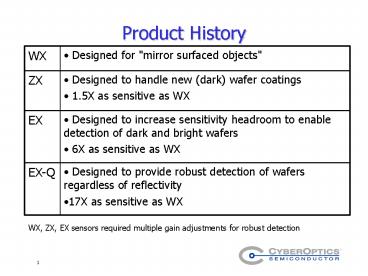Product History - PowerPoint PPT Presentation
1 / 10
Title:
Product History
Description:
Designed to increase sensitivity headroom to enable detection of ... Substantial detection headroom to detect 'extreme' wafers that are yet to be introduced ... – PowerPoint PPT presentation
Number of Views:19
Avg rating:3.0/5.0
Title: Product History
1
Product History
WX, ZX, EX sensors required multiple gain
adjustments for robust detection
2
Why did we build the EX-Q?
- Wanted a sensor that could provide
- Consistent wafer detection without frequent gain
adjustments - "Through beam like" performance
- Backward compatibility with existing EX sensors
- Maintaining flexible, off-the-shelf package of a
reflective sensor
3
What's required for accurate wafer mapping?
- Any mapping sensor (regardless of technology)
must have consistent and accurate Apparent Wafer
Thickness for reliable mapping performance - Apparent Wafer Thickness the scan distance
between the beginning (ON) pulse and the end
(OFF) pulse of the sensor's output signal
4
How did we do it?
- Reduced the thickness of the laser stripe to
0.05mm while maintaining peak response
(sensitivity) - Reduces the laser stripe's skirt or "noise" to
provide a more accurate, consistent AWT
5
EX-Q Performance vs. Wafer Reflectivity
- EX-Q maintains consistent Apparent Wafer
Thickness regardless of wafer reflectivity
Max/Min Range Expect gt99.8 of sensor
measurements to be within Max/Min range
Mapping Algorithm Safety Region Able to classify
absent, present, cross slot
6
Detecting future wafers
- EX-Q has the sensitivity and detection headroom
to detect ultra thin and/or other wafers with
extreme characteristics
Detection Headroom (on axis)
gt 1000X
gt 100X
gt 100X
gt 10X
Threshold signal detection (data normalized to 1)
7
EX-Q doesn't need gain adjustments
- EX-Q delivers both detection and accurate AWT at
the factory gain setting for most wafer types
or, all SEMI standard wafers - EX required a trade-off between detection and AWT
which demanded gain adjustments in the field as a
function of wafer type
8
Vertical tilt results in stray reflection
immunity
- EX-Q sensors have a 3 vertical tilt integrated
into the sensor to avoid FOUP back reflections
9
EX-Q Improvements
10
Backwards Compatibility
- Upgrading is easy and convenient
- EX-Q sensors have the same mechanical footprint,
electrical interface and digital output as the EX
and WX - Plug-and-play compatible with existing software
algorithms for the EX, requiring only reteaching
the robot at setup - Upgrading from the WX requires reteaching the
robot at setup and appropriate parameter
adjustment































